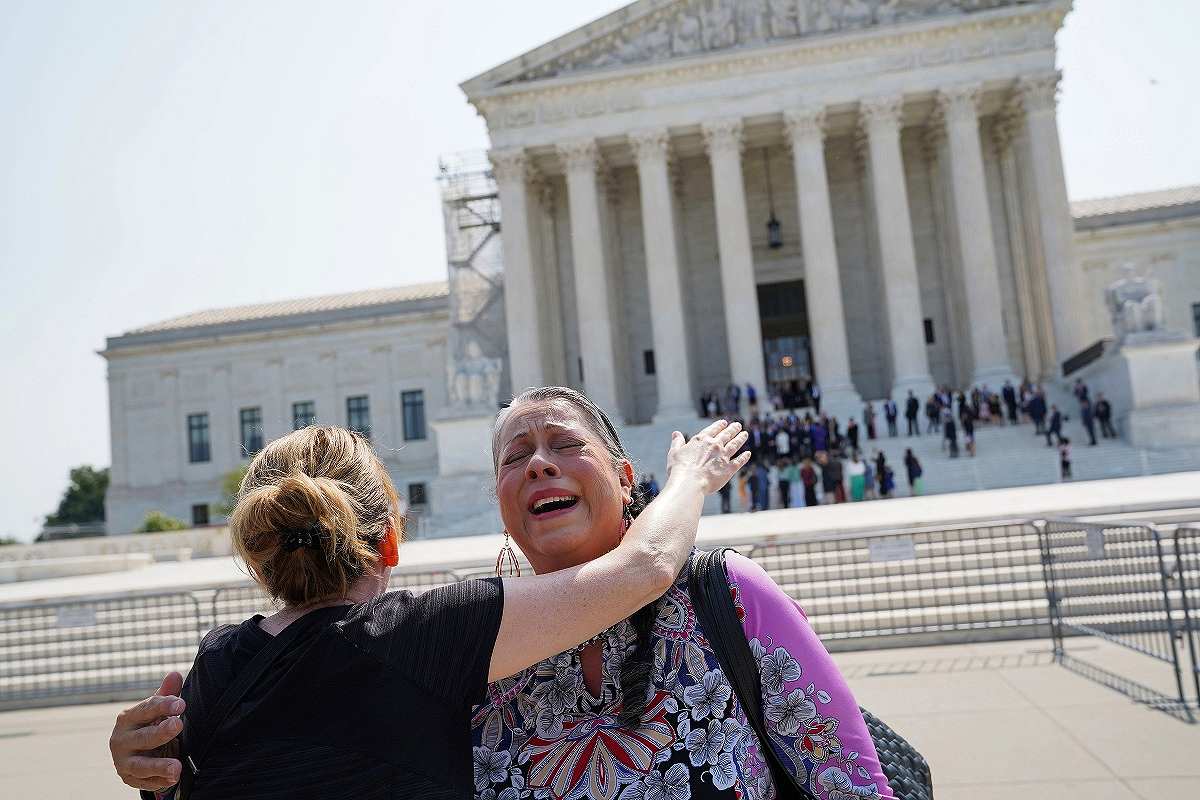
Nita Battise, a member of the Alabama-Coushatta Tribe of Texas, embraces Jennifer Margrett outside the Supreme Court building on Thursday, June 15, 2023, after the justices upheld the Indian Child Welfare Act.
17:45 JST, June 16, 2023
The Supreme Court on Thursday upheld a federal law, intended to rectify past government abuses, that gives preference to the foster care and adoption of Native American children by their relatives and tribes.
In a 7-2 decision, the court left in place the 1978 Indian Child Welfare Act (ICWA), which was passed to remedy what Congress said was a disgraceful history in which hundreds of thousands of Native American children were removed from their homes by adoption agencies and placed with White families or in group settings.
“Congress’s power to legislate with respect to Indians is well established and broad,” even when it impacts family law, an area that is primarily a state responsibility, Justice Amy Coney Barrett wrote for the majority. “It is true that Congress lacks general power over domestic relations,” Barrett added. “But the Constitution does not erect a firewall around family law.”
Justices Clarence Thomas and Samuel A. Alito Jr. dissented, with Alito writing that the majority “decides one question after another in a way that disserves the rights and interests of these children and their parents, as well as our Constitution’s division of federal and state authority.”
The law was challenged by three non-Indian couples and three states, led by Texas. The plaintiffs contended that the law requires state officials to put aside the traditional standard of doing what is best for the child, and relies on racial discrimination in ways the Constitution does not allow – and that Congress had exceeded its authority.
The tribes and their supporters argued that the law is based on political distinctions, not racial ones, and that Congress had decided the law was necessary in part to ensure the tribes had a future. They said the law was meant to rectify a past in which, studies showed, about a third of Native children were removed from their parents for foster care or adoption – with more than 85 percent of them placed in non-Native homes.
“We hope this decision will lay to rest the political attacks aimed at diminishing tribal sovereignty and creating instability throughout Indian law that have persisted for too long,” leaders of the Cherokee Nation, Morongo Band of Mission Indians, Oneida Nation and Quinault Indian Nation said in a statement celebrating the decision.
President Biden, whose Justice Department defended the law along with lawyers for several tribes, said in a statement that the court’s decision would retain a “vital protection for tribal sovereignty and Native children” and keep them connected to their communities.
The ruling Thursday did not resolve the broader question of whether the child-welfare law violates equal protection guarantees and unconstitutionally discriminates on the basis of race by placing non-Indian families on unequal footing with Indian families in disputes involving the adoption or fostering of an Indian child.
The challengers raised that issue. But the justices said the equal protection claim – which was directed at federal, rather than state officials – was not properly before the court in this case.
“Enjoining the federal parties would not remedy the alleged injury, because state courts apply the placement preferences, and state agencies carry out the court-ordered placements,” wrote Barrett, who has two adopted children.
But Thursday’s decision may not be the final word. Justice Brett M. Kavanaugh, who joined the majority, called the racial-preference issue “serious” and suggested it should be revisited. He noted that a child or prospective adoptive or foster parent could be denied placement because of race – even if the placement is otherwise determined to be in the child’s best interests.
“Those scenarios raise significant questions under bedrock equal protection principles and this Court’s precedents,” he wrote. “Courts, including ultimately this Court, will be able to address the equal protection issue when it is properly raised.”
Racial preference is at the heart of one of the biggest cases the court is expected to decide before its term ends in the next couple of weeks: whether colleges and universities can use race as a factor in college admissions decisions. In that case, conservative justices expressed doubt during oral argument about whether such affirmative action is still legally justified as way to create diverse campus populations.
The court does not say in advance which decisions it will announce on which days. The next scheduled decision day is Friday.
On Thursday, Justice Neil M. Gorsuch, the court’s most consistent supporter of Indian rights, used a separate concurring opinion to emphasize the historical backdrop to the child-welfare law, which was passed in response to the mass removal of Indian children from their families.
“The dissolution of the Indian family has had devastating effects on children and parents alike. It has also presented an existential threat to the continued vitality of Tribes-something many federal and state officials over the years saw as a feature, not as a flaw,” wrote Gorsuch, who was joined in part by Justices Sonia Sotomayor and Ketanji Brown Jackson.
Gorsuch acknowledged that federal law “sharply limits” the ability of states to impose their own family-law policies on tribal members. But, he wrote, “as we have seen, state intrusions on tribal authority have been a recurring theme throughout American history.”
In their dissents, Thomas and Alito said the child-welfare law is unconstitutional.
“The Constitution confers enumerated powers on the Federal Government. Not one of them supports ICWA,” Thomas wrote. He said the law “regulates child custody proceedings, brought in state courts, for those who need never have set foot on Indian lands . . . it fails equally under the Court’s precedents as it fails under the plain text and original meaning of the Constitution.”
Alito issued a separate dissent, emphasizing that family law decisions are core state functions aimed at serving the “best interest” of the children involved. Provisions of ICWA, he wrote, “compel actions that conflict with this fundamental state policy, subordinating what family-court judges-and often biological parents-determine to be in the best interest of a child to what Congress believed is in the best interest of a tribe.”
The broad support for ICWA in the court’s decision Thursday from seven justices was surprising, based on questions they asked at oral argument.
ICWA sets up a hierarchy of placement for Indian children, preferring first the child’s extended family, then members of the child’s tribe, then another Indian family – even if from a different tribe. At oral argument, the third provision of the law seemed to cause the most concern among conservative justices.
A lawyer for the tribes said that option – placing a child with an Indian family from a different tribe – almost never came into play, and when it did it was with members of a tribe that shared land with the child’s tribe. There was no evidence of what he called a “Maine to Arizona” adoption. He also said the court could sever that third requirement and leave the law in place.
The case arrived at the Supreme Court from the U.S. Court of Appeals for the 5th Circuit, where part of the law was upheld and part was held unconstitutional. The complicated ruling ran 325 pages, with opinions from six judges.
In a high-profile 2013 case involving a child who became known as “Baby Veronica,” the Supreme Court ruled 5-4 that the child welfare act did not require the girl, who had been adopted by a non-Native couple, to be placed in the custody of her birth father, a member of a tribe who had never had custody of the child. That case did not call for the justices to decide the constitutionality of the law.
The court also has been divided in other decisions involving Native American law. In 2020, it sided with tribal leaders in finding that a large portion of land in the eastern part of Oklahoma qualifies as an Indian reservation. Last term, the justices narrowed that decision to say both the federal government and states have authority to prosecute non-Indians for crimes committed against Indians that occur within reservation boundaries.
The case is Haaland v. Brackeen.
Top Articles in News Services
-

Survey Shows False Election Info Perceived as True
-

Hong Kong Ex-Publisher Jimmy Lai’s Sentence Raises International Outcry as China Defends It
-

Japan’s Nikkei Stock Average Touches 58,000 as Yen, Jgbs Rally on Election Fallout (UPDATE 1)
-

Japan’s Nikkei Stock Average Falls as US-Iran Tensions Unsettle Investors (UPDATE 1)
-

Trump Names Former Federal Reserve Governor Warsh as the Next Fed Chair, Replacing Powell
JN ACCESS RANKING
-

Producer Behind Pop Group XG Arrested for Cocaine Possession
-

Japan PM Takaichi’s Cabinet Resigns en Masse
-

Man Infected with Measles Reportedly Dined at Restaurant in Tokyo Station
-

Israeli Ambassador to Japan Speaks about Japan’s Role in the Reconstruction of Gaza
-

Videos Plagiarized, Reposted with False Subtitles Claiming ‘Ryukyu Belongs to China’; Anti-China False Information Also Posted in Japan


























